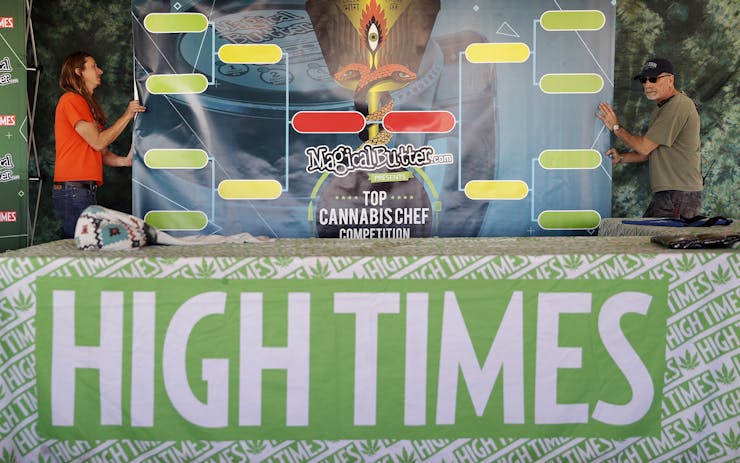It started with a phone call, a visit, and then a letter. It ended with a mildly elevated Cannabis Cup cut short by Mother Nature.
In the span of less than 24 hours last month, the Las Vegas area’s first High Times Cannabis Cup—also the first Cannabis Cup to be held on Indian reservation land—went from a full-fledged marijuana festival in a state where cannabis is legal for recreational use, to a cannabis-free convention-style expo with over a dozen empty booths and a hip-hop concert.
For one festival weekend, medicated cookies would have to just be regular cookies.
“We did everything possible to make this event compliant with federal law,” said event spokesman Joe Brezny of Las Vegas’ Argentum Nevada public relations firm, who was brought on by High Times after a Feb. 16 letter from a federal attorney’s office in Nevada, in which U.S. Attorney Daniel Bogden threatened to “enforce the Controlled Substances Act,” if federal laws against marijuana weren’t followed during the event.
Bogden’s letter added, in underlined print, that “marijuana remains illegal under federal law.” The idea that cannabis was legal on tribal land was, he wrote, “an incorrect interpretation” of the law.
“The transport, possession, use and distribution of controlled substances, including marijuana, is prohibited,” Bogden’s letter said.
Bogden, accompanied by representatives from the U.S. Drug Enforcement Administration and the FBI, also met with the council of the Moapa Band of Paiute Indians on its 115-acre reservation on Feb. 16, just five minutes after giving the tribe a phone call to notify them of his visit, former Moapa Paiute Chairman and current spokesman William Anderson said.
While last month’s meeting was abrupt and unexpected, according to Anderson, Bogden’s message was clear. If the festival was to go on, it’d have to follow strict federal guidelines. Bogden’s letter, addressed to current Moapa Paiute Chairman Darren Daboda, was emailed shortly after the meeting that same day. Bogden’s office did not respond to multiple requests for comment.
In response to Bogden, the Moapa Band of Paiute Indians and High Times agreed to take cannabis out of the event. For the first time ever, the Cannabis Cup featured cannabis-infused edibles without cannabis. For one festival weekend, medicated cookies would have to just be regular cookies, and THC-infused topical lotions, used to treat inflammation and swelling, would have to be THC-free.
Instead of sampling items at the festival and voting for Cannabis Cup winners in several different categories, including best flower, topical and edible, attendees with medical marijuana cards (adult-use cannabis still isn’t for sale in Nevada) were advised to purchase products legally at Las Vegas dispensaries and try them on their own, Brezny said. They could then vote for their favorite products via iPads stationed at a High Times festival booth.
Taking one for the team
Despite the restrictions, the Cannabis Cup went on as planned – at least for one day. And while three different interviewed vendors said they knew of fellow vendors that had dropped out of the event as a result of not being able to offer marijuana products, several others stayed on “to support the cannabis movement.”
“It came down to ‘Do we want to be there, or are we going to allow this to force us out,’” said Corey Thomas, CEO of Los Angeles-based Honey Pot Bear, a cannabis edibles and topical lotions company. Honey Pot Bear’s products have won eight Cannabis Cup awards at festivals in California since 2015. “We wanted to support the cannabis movement, so we kind of took one for the team this week.”
Thomas stood next to her company’s booth on Saturday while staff members provided free five-minute massages to festivalgoers on six different tables using the diluted Honey Pot Bear lotions. While Thomas’ company normally sells the lotions and two different THC-infused wildflower honey flavors at festivals, Honey Pot Bear peddled only T-shirts and other company merchandise on Saturday.
Some things remained the same
Other companies carried on as usual at the festival.
In the early hours of Saturday afternoon, over 200 eager festival attendees, including Las Vegas locals and visitors from as far away as New Zealand, stood in line at Gorilla Wax’s stand for the chance at a sample dab of the company’s shatter product.
‘Nobody seems to have a problem with it,’ said one festival goer, observing a dab booth.
Mexican tourists Lidia Araujo, 29, and Carlos Gomez, 40, observed the queue at Gorilla Wax’s booth on Saturday. The married couple from the Mexican state of Michoacan, who each bought general admission tickets for $65 earlier in the day, said such samples “should always be a part” of cannabis festivals.
“I thought it was banned too, but here we are,” Araujo said in Spanish, smiling. “Nobody seems to have a problem with it.” Araujo wore reflecting sunglasses and a red festival bandana to protect her face from the circulating dust stirred by wind gusts.
Moapa Paiute spokesman Anderson said about 15,000 ticket holders and 250 vendors from 15 countries attended Saturday’s event, which began Saturday at noon. He wouldn’t provide official comment on how many vendors or attendees dropped out after news of Bogden’s visit spread through local media. But he said 10,000 tickets were sold in the final week before the show, and an additional 2,000 were sold at the festival’s makeshift box office in front of the fenced-off 10-acre festival grounds on Saturday.
A dust-covered night concert from hip hop artist Ludacris on Saturday proved to be the last event for the Las Vegas area’s debut Cannabis Cup. With forecasted winds of up 30 to 40 miles per hour on Sunday and wind gusts reaching as high as 60 mph, organizers called off the second day of the event before festivalgoers arrived. Those who had already bought tickets were allowed to use them for the SoCal Cannabis Cup, which will be held from April 21 to 23 in San Bernardino.





